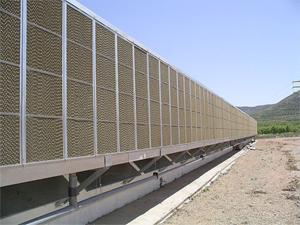Scope for Evaporative Cooling in Data Centers
Is evaporative cooling a solution? The world has reached a time where there are some major energy shortage scares. Some may be rumours, but most of them very true. There are some critical applications which cannot be accomplished without the use of large amounts of energy. Data Centers are one and cooling them another. Cooling is an integral part of the data center, saving energy here can save carbon credits, a sizable amount on your electricity bill and on the long term a lucrative business. 
Traditional cooling for data centers always have been the HVAC units. Various techniques have been experimented upon over the years to improve the efficiency of the power guzzling HVAC units. Raised floors, load based temperature control and use of air economisers are a few. They have been implemented but haven’t been very successful in providing cooling efficiency. Evaporative cooling has never been a popular choice in precision cooling; an improved form may hold the key to cheap data center cooling
What is Evaporative Cooling?
In a short, evaporative cooling is water based cooling. It uses the evaporation of water as a cooling agent unlike HVAC units which use vapour compression or absorption refrigeration. Conceptually the heat is absorbed by the water which turns to vapour; water has a large enthalpy of evaporation. This is a worthy substitute to refrigeration based cooling, and requires a continuous water source to function effectively.
Geographic Importance
Evaporative cooling works great in climates that have low humidity and high average temperatures, like temperate deserts. Most data centers due to real estate constraints are located in isolated areas of temperate deserts, if there is a reliable source of water available, evaporative cooling is a very attractive cooling option. In the United States, places like Denver, Salt Lake City, Albuquerque, El Paso, Tucson, and Fresno have naturally suitable climates for implementing evaporative cooling systems.
Advantages
- Very low installation costs, estimated to be half of that of HVAC units.
- Low cost of operation, almost a fourth of that of HVAC units.
- Increases air quality by increasing humidity in drier climates.
- Overcomes air circulation issues due to high volumetric flow rate.
- As compared to air compressors and blowers, a water pump in an evaporative cooling system consumes less power.
- Low cost maintenance and expert technicians are not required for maintenance.
Dis-advantages
- Higher the dew point, lesser the cooling, no controlled dehumidification
- High air humidity accelerates corrosion, and may also cause condensation, a major drawback when it concerns electronic equipment.
- Air quality is not suitable for people with respiratory disorders.
- Require a constant supply of water, not very feasible in dry areas.
- High mineral content in the water may cause deposits within the evaporative cooler requiring a higher frequency in maintenance.
- Atmospheric odours cannot be controlled.
- Corrosion within the evaporative cooler itself may need to be restrained with the help of a sacrificial anode.
Facing Facts
Evaporative cooling is an amazing option to cut cooling costs but not at the cost of sacrificing expensive electronic equipment. If the quality and reliability of electronic equipment is compromised, the very existence of a data center is futile. Traditional evaporative coolers are definitely not a solution but a hybrid solution where there is humidity and air quality control sounds promising. The quest for cost effective cooling does not end here!
For more industry specific information, visit http://www.datacentertalk.com.
